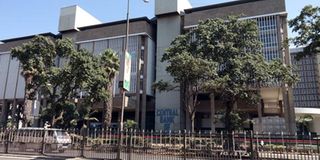IMF is a dirty word and a failure: Why celebrate fact new CBK boss worked there?

The Central Bank of Kenya building in Nairobi on June 2, 2014. FILE PHOTO | SALATON NJAU |
What you need to know:
- The IMF has become a dirty word everywhere except, it seems, in Kenya.
Here is one curious fact about the nomination process Dr Patrick Ngugi Njoroge went through to become governor of the Central Bank of Kenya.
There was a lot of fluff and frivolity. But the strangest element was the fact everyone seemed to declare he is qualified because he is “a senior economist with the International Monetary Fund”.
The IMF? Surely this should have been one of the central points of discussion and in some countries might even have triggered street protests.
The fact that he worked for that institution should certainly not be a plus. The IMF has become a dirty word everywhere except, it seems, in Kenya over the last three decades.
“Institutional Monstrous Failure”, as the editorial writers at the UK’s Guardian newspaper fumed on June 9, 2013.
It was the IMF that brought Africa the so-called structural adjustment programmes in the 1980s and 1990s.
The impact of those reforms, which saw massive retrenchment programmes, the end of free services in health institutions and disorderly privatisation in developing countries from Argentina to Senegal to Kenya, has yet to be comprehensively assessed.
Let’s just say it cost hundreds of thousands of lives and livelihoods. One study found attendance at specialised clinics for infectious diseases which suddenly started levying a fee in Kenya fell by 40 per cent for men and 65 per cent among women. Dispensaries in the villages imposed “cost-sharing” (as if it was not the locals’ taxes which were offering the ‘free’ services, anyway), keeping hundreds of thousands away.
Between 1989 and 1993, amid rising unemployment, crime in Nairobi soared by the highest rate since independence. Yes, there was the little matter of the Goldenberg scandal, but the SAPs certainly contributed.
The IMF later admitted mistakes in the speed and scope of implementation. But its senior staff, who can be described as market fundamentalists, never learnt their lessons because true believers never change course.
The latest debacle by the institution has been witnessed in Greece where the IMF and the European Central Bank introduced a version of savage SAP-like reforms in exchange for offering the distressed country a loan in 2010.
Many commentators warned it wouldn’t end well. It hasn’t. The IMF predicted the country would return to economic growth in 2012. Instead, that year alone, the country lost 400,000 jobs.
A New York Times report found “suicides have shot up. Cars sit abandoned in the streets. People sift through garbage looking for food” all because of the IMF’s failed policies.
What has all this got to do with the new man? Yes, it is true he didn’t shape all the organisation’s policies. But from the few segments of the MPs’ vetting interview which dealt with economic policy, it was clear he is a market fundamentalist.
Can the CBK do anything to control rates? No, he said. That would be a big mistake. The market will correct itself. Well, sir, I could be wrong, but I am a leftist who does not buy this business of the market correcting itself. What if it is a cartel?
Certainly, this is the point at which we should be having a major debate about the “trickle down” economics (the idea that if you make the rich richer, the wealth will eventually reach the poor) so gladly embraced by consecutive governments since 2002.
At least there was a balance of the right wing (Mwiraria, Kibaki) and left (Nyong’o and others) in Narc. Also, the Kibaki administration had the wisdom to tell multilateral donors where to take their advice when they cautioned against free primary education.
Now, it seems, trickle-down is official policy. Dr Njoroge argues it is wrong to intervene to tackle high interest rates, but the CBK’s own Monetary Policy Committee has said rates are too high.
If so, and there was political will to deal with the issue, why not ask government-owned banks to set rates at an optimal CBK-prescribed rate? The Brazilians do that regularly.
We can’t blame Dr Njoroge. He is obviously a very well-read man who, at first blush, appears to be a fellow of considerable integrity.
The blame is ours, MPs, commentators and citizenry for being so consumed by frivolity and ethnicity that we can’t have the robust debate this country needs to chart the best path to tackle poverty and grow prosperity.





